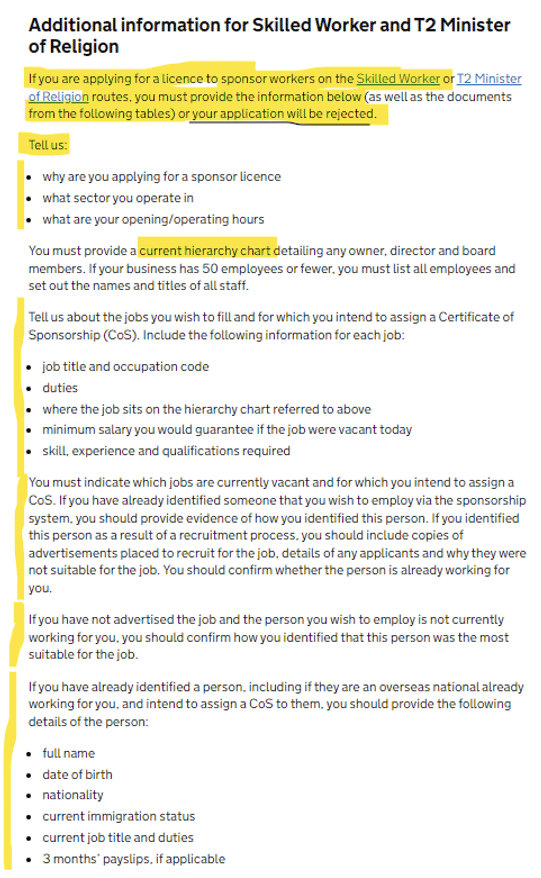Countless clients approach us after receiving a negative decision on their sponsor licence application, whether they applied on their own or through another legal representative. Negative decisions usually revolve around a relatively small number of issues, so we’ll look at the five most common pitfalls below and how to avoid them.
Rejections and refusals
But first, let’s clarify what we mean by a “negative decision.” There are two types: a “rejection” and a “refusal” of your licence application. A rejection is the lesser of two evils, as you get a refund of the licence fee and can apply again straight away. If you are refused, the Home Office keeps your application fee and imposes a minimum six-month ban on reapplying, patronisingly called a “cooling-off” period!
Without further ado, here are five common mistakes to avoid when applying for a sponsor licence:
-
Don’t forget your cover letter
Yes, there are certain mandatory documents to provide, but there’s also mandatory information required, which means a cover letter is needed. “What information do I need?” I hear you ask.
It’s all set out in Appendix A. We’ve copied the relevant bit below – and here we’re really talking about a Skilled Worker sponsor licence.
Go through what’s required, point-by-point (or get us to do it, we’ll save you time and get it right first time). If you don’t provide all the information, expect a rejection. Here’s the information requested:
Note that they want a hierarchy chart – which I would treat as a separate document that would normally sit outside of your cover letter.
-
Failing to submit all mandatory documents
Our friend ‘Appendix A’ tells us what documents need to be submitted. Unfortunately, Appendix A isn’t user-friendly, as you have to work through a series of ‘tables’, picking up the minimum 4 required documents. Most businesses will pick-out most or all of their documents from Table 4. However, some of the earlier tables have mandatory documents depending on the nature of the business (e.g. if you are a ‘start up’, food business, franchise or Care Quality Commission Regulated).
Where possible, we encourage you to submit more than the bare minimum of 4 documents, in case the Home Office take exception to a particular document.
-
Failure to prepare for a ‘compliance check’
You should consider how likely you are to be inspected as part of the licence application process. Certain businesses are much more likely to be targeted for a compliance check before the Home Office will grant a licence. Since 2022, the Home Office has increased its number of “remote compliance checks.” Compliance checks are to be avoided at all costs as the Home Office will go through your HR systems with a fine-tooth comb. At best, following any inspection your licence will be approved but subject to great delay. At worst, it’s a refusal and a 6-month cooling off period.
If targeted for a remote compliance check – you will receive the ‘dreaded letter’ asking for detailed evidence of your HR systems, giving you just 7 days to respond. Here is a redacted version of the dreaded letter!
At Truth Legal we have designed a special compliance package that will show-off to the Home Office how well you can comply with your sponsor duties. These will generally head off any compliance check. Contact us to find out more.
-
Forgetting to submit a signed Submissions Sheet
Once you submit your licence application, a Submissions Sheet becomes available to be printed. This must be signed by the person you nominated as the “authorising officer” and then sent to the Home Office, along with the rest of your supporting documents. If you don’t submit this, your application will be rejected.
-
Don’t miss the deadline to send supporting documents
From when you submit the online sponsor licence application, you have just five working days to send everything to the Home Office. Send them to the email address stated on the Submissions Sheet. Don’t delay!
More information about the sponsor licence process
If you want more information about how to apply for a licence and how to successfully manage your licence, then check out our detailed guide. Whereas most law firms will simply parrot Home Office guidance and/or entice you to ‘get in touch’ for more detail, we genuinely give all our insight away for free in our guide. This leads into the question…
Do I need a lawyer to help me with this?
Honest answer is – “not necessarily”. Our view is that you can apply on your own if you have good resources to hand (yes, including our detailed guide), you have a strong attention to detail, and you have time on your side.
However, your time is precious in many ways. We can prepare an application much more quickly and smoothly than you. We are more likely to get it right, meaning you can crack on with filling vacancies with sponsored workers much more quickly – in fact we have an exceptionally high rate of licence approval.
Aside from simply obtaining the licence, you really need to understand how sponsorship works and what is expected of you. Whilst it’s possible to get a licence without fully understanding the system, this could lead to you becoming unstuck later if/when the Home Office gets round to auditing you.
At Truth Legal, we don’t just get the licence for you, we ensure sure you properly understand how sponsorship works and help you to avoid any painful issues with the Home Office. Whist our main piece of work might be getting you a licence, we are with you throughout your sponsor licence journey, always there for you.
Despite being national leaders in sponsor licence work, we know we are considerably less expensive than many firms. If you’d like us on board, start the process now with a free consultation.
Further Reading
From one of the UK’s most read legal blogs.











